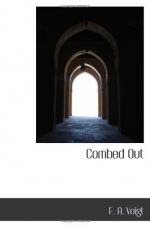The wounded were often perfectly silent. But more often they would groan or wail or shout. Sometimes they would all howl in chorus like cats on a roof. Indeed the weird and terrible howling of wounded men is more like the howling of cats than any other sound I know.
Men regaining consciousness after an operation would sometimes laugh uproariously or cackle fiendishly. Or they would break into torrents of filthy language. One man yelled in a crazy voice that England was the most glorious country on earth and that he had done his best to be a good soldier. Then he was seized by a fit of violent weeping, while someone at the other end of the theatre was shouting with intense fury: “If I had Lloyd George here, I’d shoot the blighter,” and another man was carried out with his head lolling from side to side and saying in mad, amiable tones: “Zig-zag, zagazig, zig-zag,” and so on without a break.
A man who had undergone an operation some days previously was brought in to have his wound redressed—a deep laceration, that reached from knee to hip and exposed the thigh-bone. The padding was removed, but as soon as the raw flesh was touched he threw back his head, bared his teeth, and uttered shrill, piercing cries in sudden blasts, and nothing could be done to comfort him.
Near by a wounded man had been lying quietly on a table when all at once he gave a yell and, before we could rush to the spot, he plunged head foremost and crashed down on to the floor. We picked him up, but his mind seemed too confused to realize what had happened. He did not struggle any more, but gibbered and whimpered piteously.
If the chloroform and ether were not administered with great care and skill, the patients would choke and kick and make furious efforts to tear the mask from their faces. And so great was the number of wounded and so rapidly was it necessary to perform each operation, that it was not humanly possible to devote sufficient time to each individual case. Gas was the most merciful anodyne, but it could only be used for brief operations. Under its influence men became unconscious quickly and without a struggle, and they recovered consciousness without the fearful retching and vomiting that always followed the use of chloroform or ether. And yet, even with gas, haste and carelessness and defective apparatus added suffering to suffering.
On the table lay a man with a shattered gangrenous knee. He received gas and became unconscious, but, just as the bone was being sawn through, he regained his senses. His face was ashen pale and the sweat ran down it in big drops. He was too weak to struggle, but his eyes were staring in a way that was terrible to see. I held the foot and an orderly held the stump while the saw grated harshly as it cut through the bone, and the man moaned in piteous drawling tones: “Jesus Christ have mercy upon me, God Almighty have mercy upon me, and forgive me all my sins.” When the operation was over, he was carried out, making unintelligible sounds.




